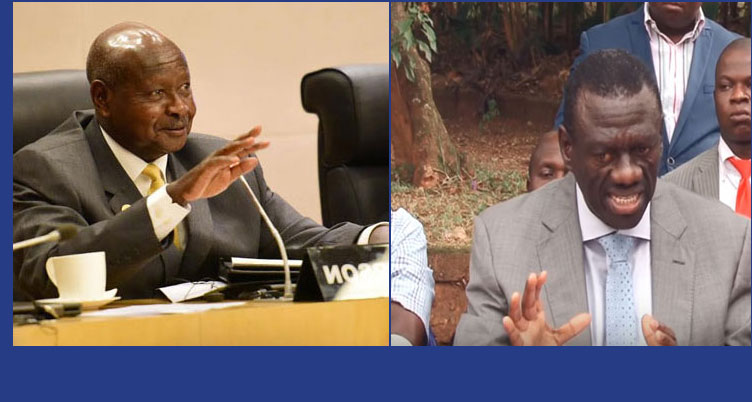
THE LAST WORD: Why Museveni said he is not a servant of anyone and who may have been the target of his statement
By Andrew M. Mwenda
On the occasion marking 31 years in power, President Yoweri Museveni told the nation that he is not a servant of the people but a freedom fighter who works for himself and his beliefs. This let loose the dogs of social media war. But the debate focused on the message and the messenger but not the purpose. It seems to me Museveni intended his message as presented. We can speculate about whom (or even what) he had in mind when he made that statement. But it shows the dangers of speaking off script especially when the target of your message is not your audience.
Opposition leader Kizza Besigye has always touted the president saying he is a servant of the people. There is something about Besigye that rubs Museveni the wrong way. I would like to think, therefore, that the president’s message could have been intended for Besigye. Many analysts are likely to argue that in the fight against Besigye, Museveni has lost his sense of public relations and thereby handed his critics a rope with which to hang him.
For me, the question is: why does Museveni feel confident to speak like that especially given its political costs? Some may think he feels comfortable because he controls the armed forces. But the miss a point; Museveni has survived in power because he never feels confident in it. He is always willing to make the most extreme political compromises and avoid antagonising even weak social groups in order to protect his position. He strikes me as politically unsure of his support base, a factor that makes him a difficult enemy to beat.
It is, therefore, possible that Museveni had a different intention in mind. He may have wanted to reinforce Besigye’s narrative that he (Museveni) is in power by force of arms, not the will of the people. This means voting in an election is a waste of time. If this was Museveni’s strategy, many voters will be discouraged from going to the polls. Museveni’s best chance at winning is a low voter turnout. Therefore, it works for Museveni to reinforce Besigye’s narrative.
Wrong servant: President Yoweri Museveni’s message to the nation that he is not a servant of the people but a freedom fighter who works for himself and his beliefs should be scrutinised for purpose – and not focus on the message itself or the messenger as has happened on social media.
Many admirers of Museveni and Besigye may never realise that the political fortunes of these two leaders depend largely on each other’s actions. Holding all factors constant, it would be hard for Besigye to gather momentum without Museveni in the race. It would equally be hard for Museveni to rally his base without Besigye as his opponent. This is the main reason why Uganda political landscape is polarised around two axes that are impregnable.
On one side are Museveni and NRM. Over the years, they have graduated into a mature and fairly tolerant political force but equally an extremely corrupt and incoherent one. They are no longer held together by a shared ideology or policy preferences but by power and the social privileges and material rewards that come with it, undergirded by the armed forces. This has made them tolerable but not loved.
On the other hand is the Besigye faction of the FDC. It began in 2000 when Besigye broke away from the NRM as a centrist democratic force initially seeking to bring Ugandans of divergent views around a common purpose of democratic reform. It has transformed into an extremely intolerant radical faction built around the cult-leadership of Besigye. Compared to the NRM, it behaves like a millenarian cult, loved by its base but intolerable to everyone else. It is now a bigger threat to democracy than NRM.
 The Independent Uganda: You get the Truth we Pay the Price
The Independent Uganda: You get the Truth we Pay the Price




The other way to speculate about Museveni’s rhetoric is that it
reinforces the myth of his invisibility. Museveni and his NRM survive
better in contradiction than in stability. More often, it is
counterbalance of contradictions that creates fictitious stability in
his regime. This keeps people guessing. And it works well with his
incredible inclusive and accommodative ability as people keep gesturing
towards him as the most viable alternative to work with. The mixture of
unpredictability and tolerance explains his magnanimity and the myth of
him as a very powerful leader. Judging his words at their face value, as
many are inclined to, reinforces the myth of his unassailable power. I am inclined to believe that his rhetoric is a provocatively intended gesture that feeds
well into his political strategy. Just thinking!
1. No one doubts M7’s comprehension of the English Language.
2. 26th January is liberation day when you contextualize what M7 meant by the term not being anyone’s servant he simply meant that he was a freedom fighter who voluntarily(without pay)fought the bad regime of UPC. he is simply dying to see Ug attain the level of a middle income earning economy .
3.Love..Love ..Love Andrew; he shock the hell out of FDC thats why Ingrid lost imagine after “giving” the FDC party (KB) all she had.
4.What did we learn from Jammeh’s dramatic exit from power?He demonstrated that; (i)African leaders also have feelings.(ii) As they leave power,they need moral/psychological support e.g,thier supporters have to 1st cry and faint as a sign of their undying love for them(iii) Never threaten them with ICC talk(iv)Give them time as they pack their belongs like ;Cars,saucepans etc.
5.The Kasimo committee appears stupid to me; they are asking so many irrelevant qns to the URA staff this was a unique payment in Ug History there was no formal way of sharing the cash it just had to be shared .M7 okayed the payment who can hang him?Was there any trace of theft by the URA officials of course no? The only qn they should ask Akol (Which should take only 30 minutes)is why did they request for a supplementary Budget?the payment was straight forward simply get 0.2% from the trillions paid..
It is all speculation, for the only person who knows what exactly the utterance is all about is Museveni himself. My only take is whatever the circumstances, the only ones shocked by the utterance are those who up to now have not yet or do not understand the person of Museveni. He took the entire nation to war for purely personal ambitions and he has always been clear and steady about it. So for those who think that Museveni has diverted from the original objectives, let them know that they have no idea what they signed up for. If he set out to achieve personal goals and objectives why should anyone think that he works for them? Parliament and the elections are impediments in his frame mind, even with their existence, does anybody think they affect him in any way?, he always gets what he wants when he wants it.